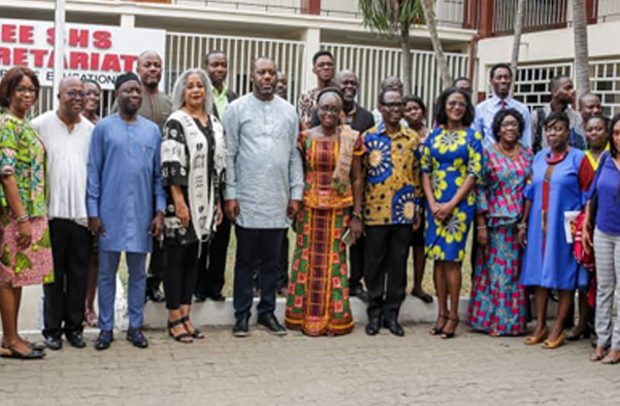Ghana’s Minister of Education, DR. Matthew Opoku Prempeh, and USAID/Ghana Mission Director, Sharon L. Cromer, in a group photo with some of the attendees and dignitaries at the ceremony.
Ghana and the U. S have launched two initiatives aimed at promoting quality education for Ghanaian children.
The end-line impact evaluation report for the United States Agency for International Development’s (USAID) Early Grade Reading program and the distribution and production of instructional materials for the Transition to English (T2E) initiative are to advance early grade reading for school children and provide a rich reading environment in schools to ensure learners have access to books, which are critical to develop their reading skills.
Dr. Mathew Opoku Prempeh, Minister of Education, and USAID/Ghana Mission Director Sharon L. Cromer, launched the two programmes in Accra.
From January 20-24 this year, USAID and the Ghana Education Service (GES) sent over 88,000 newly validated English and Ghanaian Language materials to 230 schools in 19 districts across the country.
The materials include Teacher Guides, Learner’s books, Supplementary Readers, and classroom materials as well as Alphabet Charts expected to benefit over 18,000 B1 to B3 learners.
These materials are building upon nearly 3.1 million materials that were developed, printed, and distributed since the start of the 2017/2018 academic year.
In early January 2020, 73 master trainers were trained in the use of the “Transition to English” reading materials.
They included training participants from the MoE; national, regional and district offices of the GES; and from colleges and universities.
From January 13 through 23, the master trainers then trained and supported more than 1,300 teachers, assistant headteachers, headteachers, curriculum leads, and circuit supervisors on the use of these materials and build their capacity to deliver engaging and effective reading lessons to improve children’s reading abilities.
USAID’s “Learning” program is a six-year activity that supports Ghana’s MoE, GES, and affiliated educational institutions to improve reading performance for early grade pupils in public primary schools.
Learning’s Early Grade Reading program is aligned with USAID’s global goal of “all children reading,” which was implemented from December 2014 through September 2019 using local Ghanaian languages for instruction.
During the 2017-2019 academic years, more than 7,200 schools in 100 districts implemented the Early Grade Reading Program (EGRP) throughout 10 regions of Ghana. More than 707,843 Kindergarten 2 and Primary 1 and 2 pupils benefited from the project, and over 51,000 teachers, Head Teachers and Curriculum Leads received high-quality instructional materials and training in innovative reading instruction methodology.
A Transition to English (T2E) program is being implemented from October 2019 through September 2020 to demonstrate proof of concept in transferring reading skills from local languages to English.
The T2E program builds on the EGRP program by utilizing a systematic phonics-based program with strong vocabulary, language comprehension, and writing that is aligned with and links to the newly introduced Ghanaian curriculum.
Key components of the Learning T2E program intervention is to make quality teaching and learning reading materials available and to build the capacity of teachers in use of these reading materials to support learners to develop reading skills of early grade students in English and Ghanaian languages.
USAID has also supported the MOE and GES, in collaboration with the National Council for Curriculum and Assessment, to develop and validate context relevant teaching and learning materials in English and Ghanaian languages, including teacher guides, pupils books, supplementary readers, and classroom materials as well as alphabet charts, aligned to the new curriculum.
By Jamila Akweley Okertchiri


